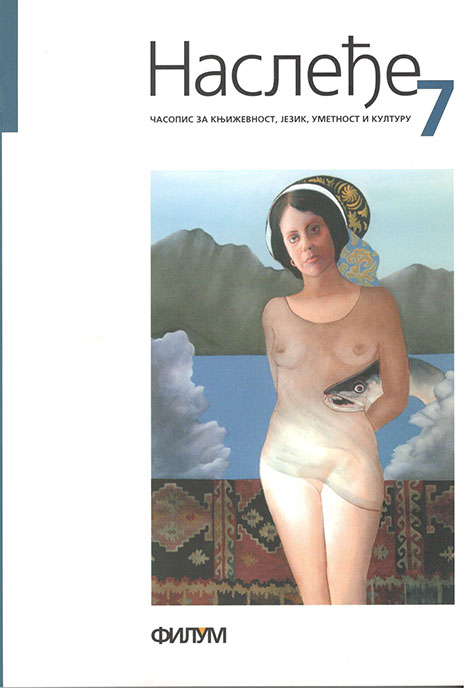THE SUCCESS OF FAI LURE: WALTER BENJAMIN ’S PHILOSOPHY OF HISTORY
Keywords:
Walter Benjamin, philosophy of history, historiography, Marxism, Messianism, historical interpretationAbstract
In “The Success of Failure: Walter Benjamin’s Philosophy of History” Sanja Bahun offers a new reading of one of the most influential and most controversial philosophies of history in contemporary thought. This project is premised on the Benjaminian conviction that the “state of emergency” is a philosophical-historical given, a condition which demands a constant reconfiguration of our perception of and practice in history. Bahun probes the relevance of Benjamin’s thought for contemporary social and historical practice through an overarching reinterpretation of Benjamin’s late writings such as “On the Concept of History” (“Über den Begriff der Geschichte,” 1940), the texts comprising The Arcades Project (Passagenwerk), and the corresponding fragments from diaries and archives. Out of this reassessment, the concept of “unsuccess” or “failure” emerges as the structural and contentual crux of Benjamin’s philosophy of history.
References
Agamben, Giorgio. The Time That Remains: A Commentary on the Letter to the Romans. Trans. Patricia Daily. Stanford: Stanford University Press, 2005.
_ _ _. “A Portrait of Walter Benjamin.” In Prisms. Trans. Samuel and Shierry Weber . Cambridge, Mass.: MIT Press, 1982. 227–241.
Arendt, Hannah. “Introduction.” In Illuminations. Ed. Hannah Arendt. Trans. Harry Zohn. New York: Schocken Books, 1988.
Bahti, Timothy. “History as Rhetorical Enactment: Walter Benjamin’s Theses ‘On the Concept of History’.” Diacritics (September 1979): 2–17.
Beiner, Ronald. “Walter Benjamin’s Philosophy of History.” Political Theory 12/3 (August 1984): 423–434.
Benjamin, Walter. The Arcades Project. Trans. Howard Eiland and Kevin McLaughlin. Cambridge, Mass.: Harvard University Press, 1999.
_ _ _. Gesammelte Briefe. Ed. Christoph Gödde and Henri Lonitz. Frankfurt: Suhrkamp, 2000.
_ _ _. “N [Re the Theory of Knowledge, Theory of Progress].” In Benjamin: Philosophy, Aesthetics, History. Ed. Gary Smith. Chicago, 1989. 43–83.
_ _ _. “On the Concept of History.” In Selected Writings. Vol. IV: 1938–1940. Trans. Edmund Jephcott et al. Ed. Howard Eiland and Michael W. Jennings. Cambridge, Mass.: Harvard University Press, 2003. 389–400.
_ _ _. <Paralipomena to ‘On the Concept of History’.> In Selected Writings. Vol. IV: 1938–1940. Trans. Edmund Jephcott et al. Ed. Howard Eiland and Michael W. Jennings. Cambridge, Mass.: Harvard University Press, 2003. 401–411.
_ _ _. “Über den Begriff der Geschichte.” In Gesammelte Schriften. Eds. Rolf Tiedemann and Hermann Schweppenhäuser. Frankfurt: Suhrkamp, 1974–1989. Vol. I/2. 693–703.
(Encyclopaedia) Britannica Online. 20 May 2007. < http://www.britannica.com/eb/article-9078625 >
Buck-Morss, Susan. The Origin of Negative Dialectics: Theodor W. Adorno, Walter Benjamin, and the Frankfurt Institute. New York: The Free Press, 1977.
_ _ _. “Walter Benjamin—Revolutionary Writer (II).” New Left Review 129 (September-October 1981): 77–95.
Caygill, Howard. “Walter Benjamin’s Concept of Cultural History.” In The Cambridge Companion to Walter Benjamin. Cambridge: Cambridge University Press, 2004. 73–96.
Cohen, Tom. Ideology and Inscription: Cultural Studies after Benjamin, De Man, and Bakhtin. Cambridge: Cambridge University Press, 1998.
Connerton, Paul. How Societies Remember. Cambridge: Cambridge University Press, 1989.
De Man, Paul. The Resistance to Theory. Minneapolis: University of Minnesota, 1986.
Derrida, Jacques. “Force of Law: The ‘Mystical Foundation of Authority’.” Cardozo Law Review 11 (1990): 919–1045.
Gasché, Rodolphe. “Saturnine Vision and the Question of Difference in Walter Bejamin’s Theory of Language.” In Benjamin’s Ground: New Readings of Walter
Benjamin. Ed. Rainer Nägele. Detroit: Wayne State University Press, 1989. 83–104.
Habermas, Jürgen. “Bewusstmachende oder rettende Kritik—die Aktualität Walter Benjamins.” In Zur Aktualität Walter Benjamins. Aus Anlaß des 80. Geburtstags von Walter Benjamin. Ed. Siegfried Unseld. Frankfurt: Suhrkamp,
1972. 173–223.
Harootunian, Harry D. “The Benjamin Effect: Modernism, Repetition, and the Path to Different Cultural Imaginaries.” In Walter Benjamin and the Demands of History. 62–87.
Jacobson, Eric. Metaphysics of the Profane: The Political Theology of Walter Benjamin and Gershom Scholem. New York: Columbia University Press, 2003.
Jay, Martin. The Dialectical Imagination: A History of the Frankfurt School and the Institute of Social Research. Boston: Little, Brown, 1973.
Kittsteiner, Heinz-Dieter. “The Allegory of the Philosophy of History in the Nineteenth Century,” Walter Benjamin and the Demands of History . 41–61.
Literatur über Walter Benjamin: kommentierte Bibliographie 1983–1992. Eds.
Reinhard Markner and Thomas Weber. Hamburg: Argument, 1993.
Marx, Karl. The Eighteenth Brumaire of Louis Bonaparte (selections). In Selected Writings. Ed. Lawrence H. Simon. Indianapolis and Cambridge: Hackett Publishing Company, 1994. 187–208.
Materialien zu Benjamins Theses “Über den Begriff der Geschichte.” Beiträge und Interpretationen. Ed. Peter Bulthaup. Frankfurt: Suhrkamp, 1975.
McCole, John. Walter Benjamin and the Antinomies of Tradition. Ithaca: Cornell University Press, 1993.
Müller-Schöll, Nikolaus. “Review: Beatrice Hanssen, Walter Benjamin's Other History: Of Stones, Animals, Human Beings, and Angels.” MLN 113.5 (1998): 1220–1223.
Raulet, Gérard. Le caractére destructuer. Esthétique, théologie et politique chez Walter Benjamin. Paris: Aubier, 1997.
Rancière, Jacques. The Names of History: On the Poetics of Knowledge. Trans. Hassan Melehy. Minneapolis: University of Minnesota, 1994.
Ricoeur, Paul. Time and Narrative. Vols. 3. Chicago: The University of Chicago Press, 1984.
Scheurmann, Ingrid. “Als Deutscher in Frankreich: Walter Benjamins Exil, 1933–1940.” In Für Walter Benjamin. Eds. Ingrid Scheurmann and Konrad Scheurman. Frankfurt: Suhrkamp, 1992.
Scholem, Gershom. On Jews and Judaism in Crisis. New York: Schocken Books, 1976.
_ _ _. Walter Benjamin—die Geschichte einer Freundschaft. Frankfurt: Suhrkamp, 1975.
Steiner, Uwe. “The True Politician: Walter Benjamin’s Concept of the Political.” New German Critique 83 (Spring-Summer 2001): 43–88.
Tiedemann, Rolf. “Historical Materialism or Political Messianism?” The Philosophical Forum 15/1–2 (Fall-Winter 1983–84): 71–104.
_ _ _. Studien zur Philosophie Walter Benjamins. Frankfurt: Europäische Verlagsanstalt, 1965.
Walter Benjamin and the Demands of History. Ed. Michael P. Steinberg. Ithaca and London: Cornell University Press, 1996.
Wiesenthal, Liselotte. Zur Wissenschaftstheorie Walter Benjamins. Frankfurt: Vertelsmann, 1973.






